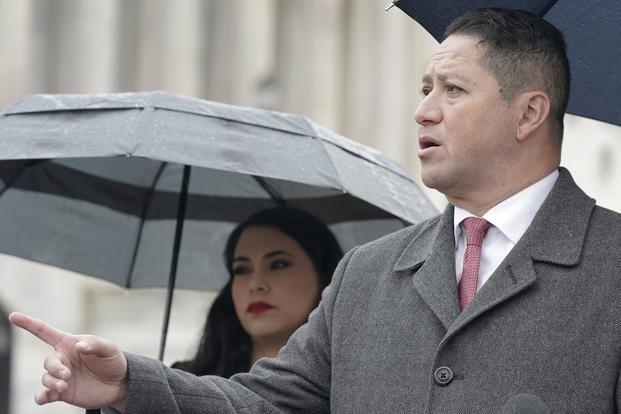A Republican lawmaker with a military spouse called threats to fire federal workers in relation to the ongoing government shutdown “a mixed bag.”
The shutdown is now in its third week, becoming the third-longest ever as Oct. 20 represented the 19th day of closure. Only the shutdowns of 1995 (21 days) and 2018-19 (35 days), the latter occurring during President Donald Trump’s first term in office, have exceeded the gridlock that looks likely to continue as Republicans and Democrats dig their heels against their partisan opposition.
U.S. Rep. Tony Gonzales (R-TX) told NPR Morning Edition host Steve Inskeep on Monday that his wife, a U.S. Air Force employee, is currently furloughed. Gonzales, a U.S. Navy vet, recalled how during his own two decades of service he was also personally impacted by political squabbles in Washington D.C.
Inskeep asked the congressman how he feels about the federal government’s response to fire federal workers as the shutdown continues.
“It’s a mixed bag,” Gonzales said. “One, I do believe there is too much bureaucracy in government, period. I don’t care what department you’re in.
“But two, there are also some amazing federal employees all throughout our country that are doing great work. In my eyes you need to go through with a scalpel and kind of find out how you make a department more efficient without gutting the functions of what they do. That’s the balance of it. Frankly, that’s the role Congress needs to be playing.”
‘Anxious’ Feeling
Gonzales, who sits on the House Appropriations Committee, said he hopes the Senate takes on bills his committee has already moved forward that he said will boost the VA and agriculture, etc.
He praised Trump for exempting American troops from the budget chaos.

Last Wednesday, the president signed an order to pay the approximate 1.3 million active-duty military members who risked losing income—directing Defense Secretary Pete Hegseth "to use for the purpose of pay and allowances any funds appropriated by the Congress that remain available for expenditure in Fiscal Year 2026 to accomplish the scheduled disbursement of military pay and allowances for active duty military personnel.”
Whether or not government workers have already been fired is unknown, Gonzales added, citing mixed reporting. He also said that any notion of federal workers being on some form of “vacation” in light of the shutdown is misguided.
“We’ve got a small Catholic family of six to provide for, so a lot of us are anxious—my family included,” he said.
He also immediately shot down a question of whether Republicans and Democrats will reach some sort of compromise, saying that Republicans “aren’t gonna budge, aren’t gonna break, aren’t gonna bend.” The onus is on Democrats, who have advocated to protect Obamacare subsidies, to pass a clean resolution, he added.
'Stronger Measures' In Negotiations
The U.S. Senate is expected to reconvene Monday as the House, led by Speaker Mike Johnson, has essentially abdicated its own duties by forcing its counterpart in the other chamber to reach some sort of resolution.
The White House, on its website, shows a running clock and references how “Democrats have shut down the government.”
Top White House economic advisor Kevin Hassett predicted Monday on CNBC’s Squawk Box that the government shutdown is “likely to end sometime this week,” saying that Democrats may be more willing to reach an agreement following Saturday’s “No Kings” protests.
If a deal fails to come to fruition in the days ahead, Hassett said the Trump administration may impose “stronger measures” to force Democrats to cooperate.
“I think that the White House is going to have to look very closely, along with [White House budget chief Russell] Vought, at stronger measures that we could take to bring them to the table,” he said.
Some state officials have started to take the situation into their own hands.
Maryland Governor Wes Moore (D) announced a series of actions on Oct. 1 to help state residents impacted by the shutdown. That includes providing resources to veterans who comprise approximately one in four federal civilian employees.
In the initial days of the shutdown, one military organization told Military.com that food pantry visits spiked to 34 percent in one region of Texas.













